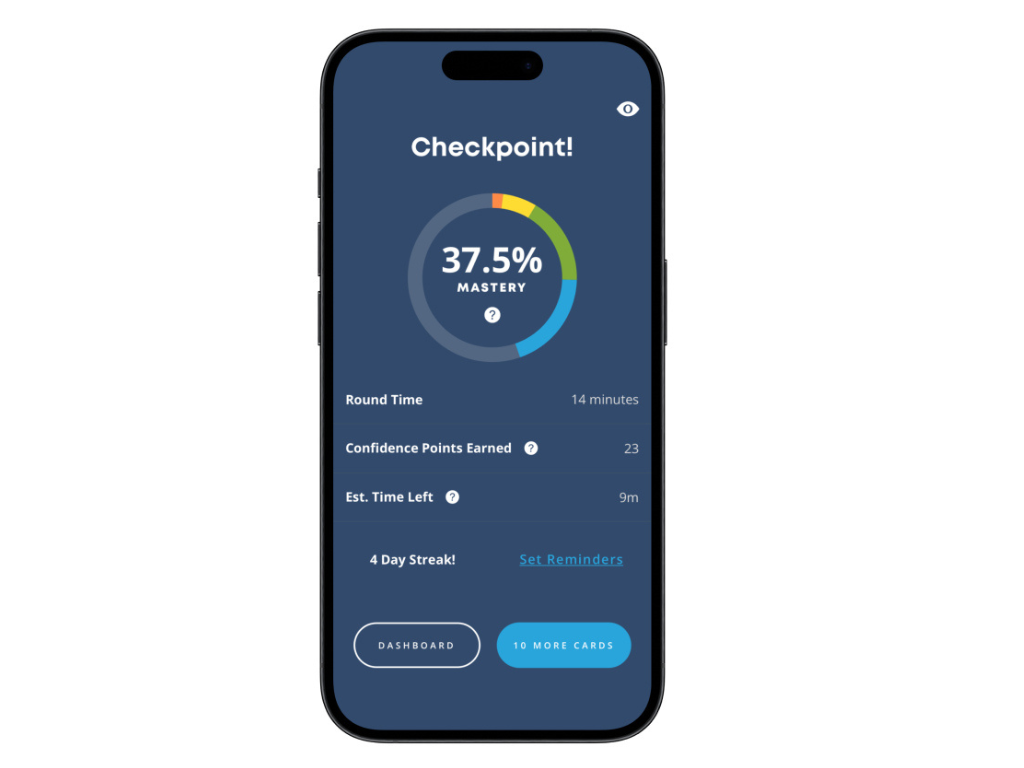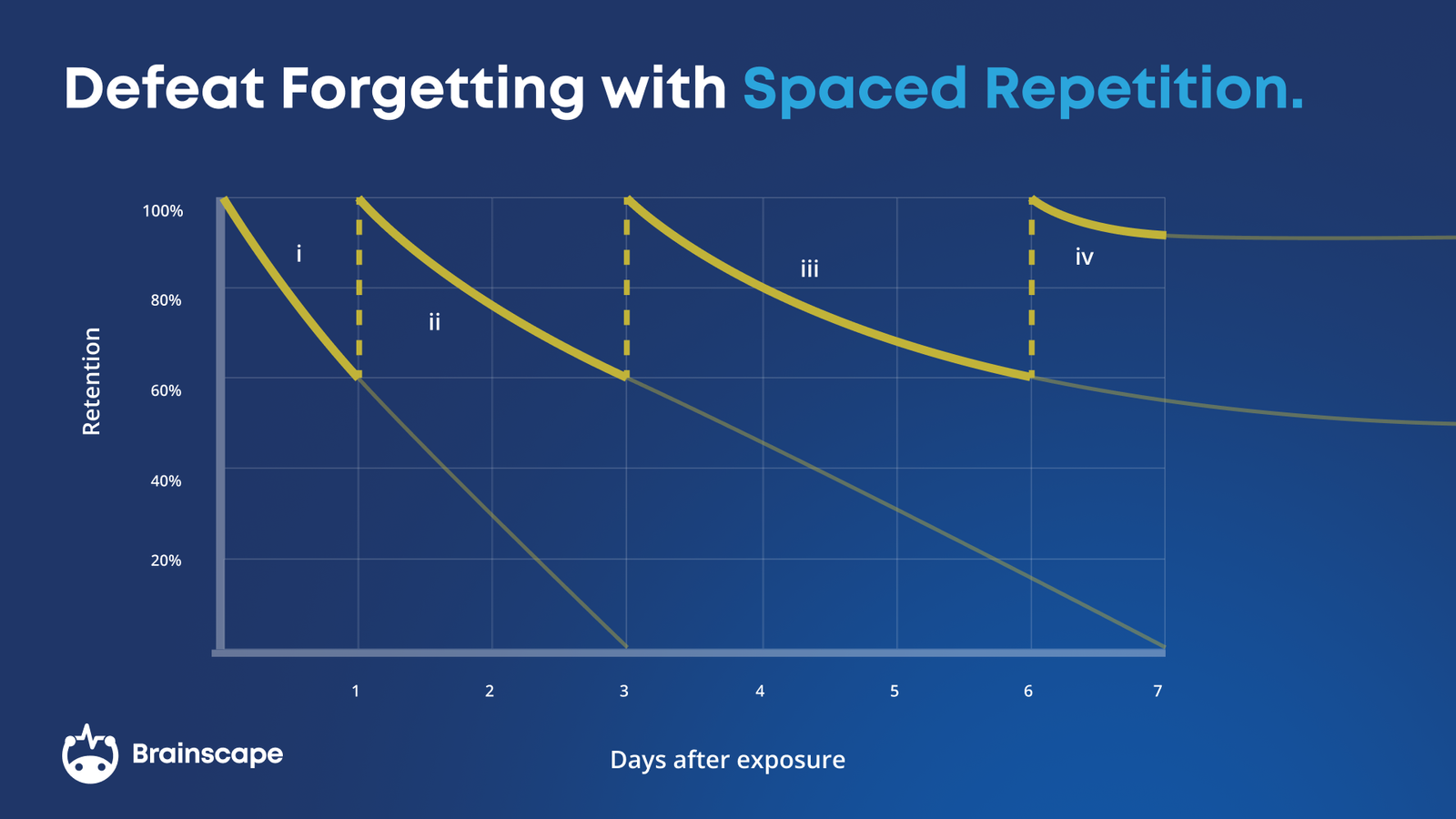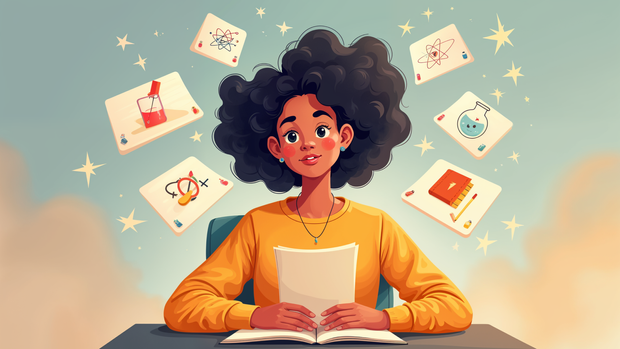If you have ADHD, studying can feel like an exercise in herding cats through a laser maze. Your brain is sprinting in every direction except the one you need it to. The world is full of a million things you need to do and a million fun things you could be doing, plus your dozens of unfinished craft projects.
But flashcards are a study tool that thrives in chaos.
Flashcards for studying are simple, adaptable to your unique cognitive machinery, and—best of all—engaging. They’re like the fidget spinner of study tools, giving your brain something active to do, engaging your eyes and your hand, while actually helping you learn.
Let’s explore how these bite-sized knowledge boosters and how spaced repetition flashcard apps like Brainscape can totally transform your study game if you have ADHD!
TL;DR – Are flashcards helpful for people with ADHD?
Oh, are you in a rush? That’s okay! Here’s the TL;DR of this article… but if you want more in-depth explanations, please keep reading!
- How do people with ADHD learn best? Through stimulating, bite-sized study tools like flashcards that keep their attention and build momentum.
- Are flashcards good for the brain? Yes! They improve memory and focus while breaking down barriers like monotony and motivation struggles.
- Flashcards for ADHD learners are engaging and effective, offering active recall and short bursts of focus—perfect for ADHD brains.
- Active recall boosts memory. Flashcards compel you to retrieve information, strengthening neural connections and improving focus.
- What is the best memory-building method for people with ADHD? Flashcards! They simplify information, making complex topics manageable and easier to study.
- Digital flashcards are way better than paper flashcards. Apps like Brainscape offer multimedia options, progress tracking, and adaptive algorithms to keep ADHD learners engaged.
- How to make studying fun with ADHD? Use digital flashcards to mix up your study sessions with images, audio, and variety to beat boredom and stay on track.
How flashcards help people with ADHD learn

ADHD brains need a feeling of stimulation and urgency in order to focus. The monotony of reading endless textbook pages or staring at slideshows just isn’t realistic or sustainable as a study habit.
Flashcards for ADHD, however, are all about quick bursts of information. They keep your brain engaged by serving up content in manageable, digestible study sessions.
(Read: ADHD test-taking strategies & study tips)
Flashcards compel you to use active recall, which helps you learn faster
Flashcards for studying compel you to actively retrieve information from memory rather than passively rereading or recognizing it on the page. By recalling information “from scratch”, you not only strengthen your memory of that information but it also engages a higher level of focus, which is important for the ADHD brain. Think of it as weightlifting for your brain—each card is another rep!
Flashcard study has plenty of opportunities for natural breaks
Let’s face it: ADHD can make sustained attention (on the right thing) tough. Flashcards, however, lend themselves to both long and short study intervals. The flashcard app Brainscape, for example, delivers 10-flashcard study rounds before pausing for a progress update, which you see as a “percentage mastery” score.

This makes it easy to whip out the app, study a quick 2-minute round, and then put it away, empowering you to turn those scattered moments of downtime into focused, profitable study sessions.
(Of course, you could also keep studying if you have the time and focus, nailing two, three, or thirteen 10-flashcard study rounds! The more you do, the more the benefits of spaced repetition compound.) Speaking of which…
Flashcards are the perfect vehicle for spaced repetition
Digital flashcards for ADHD learners are especially effective because they incorporate a learning tactic called spaced repetition. This science-backed method ensures you revisit concepts just before you’re about to forget them, reinforcing memory without overwhelming your focus.
Spaced repetition is exactly as it sounds: the staggered delivery of concepts or facts at time intervals that are based on how well you know them. So if you don’t know a concept well or at all, a spaced repetition system will have you studying that concept again in a short amount of time: in minutes. If, however, you know a concept really well, that same system won’t show it to you again for a while: perhaps weeks.

Through this repeated exposure at time intervals that are tailored to your unique understanding of a subject, those concepts will quickly become deeply embedded in your memory. And this will happen so much faster than if you just passively read and reread the textbook over and over again! That’s why spaced repetition is the fastest way to learn and remember new information!
Flashcards are the best vehicle for study with spaced repetition. Digital flashcards are even better because they come with fancy study algorithms that automate this timed delivery of individual concepts. (Otherwise, you’d spend half your study time deciding WHEN to study each flashcard again.)
For more ADHD study tips, check out the following video…
(Read: Why fidgeting can help students with ADHD)
Digital flashcards as study tools for people with ADHD: tackling specific challenges
As I just explained, paper flashcards are better than reading the textbook, but they’re not very ADHD-friendly. Digital flashcard apps like Brainscape, however, automate spaced repetition and are far more engaging for neurodivergent brains:
Interactive learning keeps you hooked
Digital flashcards allow you to upload multimedia content like images and audio clips. Use sounds and pictures to make each card dynamic and boost your memory associations. Studying anatomy? Add diagrams. Learning a language? Embed pronunciation audio. The more sensory input, the more your ADHD brain stays engaged.
Progress tracking for instant feedback
People with ADHD thrive on immediate rewards. With flashcard apps like Brainscape, you can see your progress in real time. Each completed card or mastered deck feels like a mini win, keeping you motivated and on track. Touch the number, see the color, and move to the next card.

Customizable for your learning needs
Brainscape’s AI flashcard generator and sophisticated flashcard authoring tools allow you to create personalized study assets that fit your learning style. Focus on what’s hardest for you, skip what you already know, and build study sessions around your unique attention fluctuations.
Left it all to the last minute?
We get it. You work better under pressure and you start work when it's urgent. Here's how flashcards help you squeeze maximum learning out of the minimum available time.
Portability for on-the-go study
ADHD often means you’re juggling a dozen things at once. Flashcards for studying fit right into your busy life. Study on the train, in line at a shop, in your dentist’s waiting room, or behind a slow walker … any of those boring moments where you have to wait a couple of minutes or more can suddenly be productive and engaging.
Removing motivation barriers
The hardest part of accessing study tools for people with ADHD is usually getting started. Paper flashcards for studying require so much set-up time and physical reshuffling every time. That presents a large hurdle to your executive function before you’ve even begun!
By allowing you to start studying—and pick up exactly where you left off—with the single tap of a button, digital flashcards minimize study inertia, delivering you directly to dopamine hits through flashcard completion, increasing your probability of actually studying. Less energy on setup means more energy for study.
Beating boredom with variety
Studying the same way every day? No thanks. With flashcards for ADHD, you can mix up your study sessions. Jump between topics, shuffle decks, or switch up your review mode to keep things fresh.
Check out our tips on how to learn more while studying less.
Conclusion: are flashcards good for people with ADHD?
Absolutely. Flashcards for studying are not just a helpful tool—they’re one of the top ADHD learning hacks. Whether you’re studying for a college exam, mastering a new skill, or brushing up on trivia for game night, flashcards for ADHD learners offer the perfect balance of structure and engagement.
Digital flashcards take these benefits to the next level. With adaptive algorithms, multimedia options, and on-the-go convenience, apps like Brainscape transform studying into one of the most accessible and sustainable study tools for people with ADHD, providing a learning experience that’s actually fun.
So, if you’re ready to supercharge your learning and harness the strengths of your wandering mind, you can download Brainscape here. Your focus—and your grades—will thank you!
If you found this article helpful, here are some others we think you'll love...
- ADHD test-taking strategies & study tips
- Why fidgeting can help students with ADHD
- How keyboard shortcuts could revive America’s economy
Sources
- Ebbinghaus, H. (1913). Memory: A contribution to experimental psychology. New York: Teachers College, Columbia University.
- Job, V., Dweck, C. S., & Walton, G. M. (2010). Ego depletion—Is it all in your head? Implicit theories about willpower affect self-regulation. Psychological Science, 21(11), 1686-1693.
- Marx, I. et al. (2018) ‘ADHD and the choice of small immediate over larger delayed rewards: A comparative meta-analysis of performance on simple choice-delay and temporal discounting paradigms’, Journal of Attention Disorders, 25(2), pp. 171–187.
- Oh, H. and Kim, K. (2019) ‘Effect of a Multi-Sensory Play Therapy Program on the Attention and Learning of Children with ADHD’, Journal of The Korean Society of Integrative Medicine, 7(4), pp. 23–32.
- Orbell, S., & Verplanken, B. (2010). The automatic component of habit in health behavior: Habit as cue-contingent automaticity. Health Psychology, 29(4), 374.
